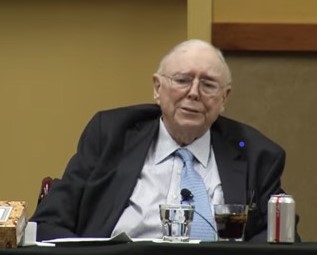Charlie Munger, Warren Buffett’s business partner for over 50 years, still has a great deal of wisdom to offer us younger investors. As he says, we have to keep learning everyday whatever our age.

So, here is one of his recent aphorisms, taken from one of his recent podcasts (Warren Buffett respects this idea so much that he included it in his recent letter to Berkshire Hathaway shareholders):
“The world is full of foolish gamblers, and they will not do as well as the patient investor.”
There is a great deal of impatience within the investing community, a drive towards get-rich-quick ideas.
Not for them spending weeks getting to really understand a firm’s strategy, its competitive position and its pricing power.
Not for them getting to know the managers well enough to make an assessment of their degree of competence and the degree to which they act with integrity regarding their shareholders.
Not for them the quiet accumulation of knowledge about the profit history, the financial stability and the vulnerabilities of a company; nor the hard work of going through the notes to the accounts going back many years.
No, they prefer to gamble on the next “big-thing”, or on a chart pattern, or on a sense of where market sentiment is taking a share, or on a macroeconomic projection.
They are in such a hurry – and so over-confident in their “analysis” – that they feel compelled to gear up their investment punts either by borrowing to invest or by using derivatives.
It’s one of the great ironies of investing that those who follow the path of sensibly striving merely for satisfactory returns, when combined with the other two characteristics of an investment operation of (1) a thorough analysis of the facts, and (2) a margin of safety, end up out-performing those who profess an ability to achieve extraordinary success by out-guessing the market.
Be patient. Do the hard graft to understand what you’re investing into.
Be patient. Remember investment has four elements (1) Preparation, (2) Discipline (stick to true investment rules and don’t start down the path of speculation), (3) Patience, and (4) Decisiveness. For the vast majority of the time you cannot be decisive, that is, actually buy something or sell something. There are long periods of “inactivity” on that score. But there should be a great deal of activity on the “preparation” front all the time.
Be patient: wait for Mr Market to do something foolish and leave a juicy opportunity on the table offering a large margin of safety. These opportunities are few and far between, and so you will not find them everyday.
Be patient: wait for Mr Market to recognise the intrinsic value of a share you hold. Sometimes it can take 2 or 3 years until the market starts to weigh its merits properly.
Be patient: do not pull the flowers and water the weeds. There is a natural human tendency to want to sell something that has risen nicely. This increases bragging rights; going home to spouse and saying you’ve made say a 50% return. But if you had been patient you might have made 400%. Don’t rush. Conduct valuations as news comes out about a company and if it is still under-priced relative to intrinsic value continue to hold.
On the other hand there is a human tendency to hold on to shares that have fallen; a reluctance to crystalise a loss – no bragging rights in that. People tell themselves that if they hold on then they might get to the psychologically important point of “breaking-even” on the investment.
But if the share price has fallen because of a deterioration in the economics of the business or the quality of the managers then it should be sold even if the loss has to be reported to a spouse. Use the money for true bargains.
Prof Glen Arnold now offers a Managed Portfolio Service at Henry Spain Investment Services under which clients’ portfolios contain the same shares as his (write to Jackie.Tran@henryspain.co.uk)














